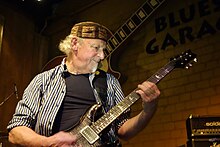Martin Barre
| Martin Barre | |
|---|---|

Barre 2013 performing in Germany, Bluesgarage Isernhagen
|
|
| Background information | |
| Birth name | Martin Lancelot Barre |
| Born |
17 November 1946 Kings Heath, Birmingham, England |
| Genres | Progressive rock, folk rock, hard rock |
| Occupation(s) | Musician, songwriter |
| Instruments | Guitar, bouzouki, mandolin, flute, saxophone |
| Years active | 1966–present |
| Labels | RandM, Fuel 2000, Chrysalis, Eagle, Roadrunner, EMI, Capital, Island |
| Associated acts | Jethro Tull, Fairport Convention |
| Website | www.martinbarre.com |
| Notable instruments | |
Martin Lancelot Barre (/bɑːr/; born 17 November 1946) is an English rock musician best known for his work with progressive rock band Jethro Tull, with whom he recorded and toured from their second album in 1969 to the band's dissolution in 2014. In the early 1990s he initiated a solo career that now spawned four studio albums plus several guest appearances.
He has also played the flute and other instruments such as the mandolin, both on-stage for Jethro Tull and in his own solo work.
Martin Barre was born in Kings Heath, Birmingham, West Midlands, England on November 17, 1946. His father was an engineer who had wanted to play clarinet professionally. In grammar school Barre played flute. When Barre bought his first guitar his father gave him albums by Barney Kessel, Johnny Smith and Wes Montgomery to broaden his musical perspectives.
In college he studied architecture at Lanchester Polytechnic (now Coventry University) for three years, but did not complete his studies after failing Spanish and Atomic Science, subjects that he found to have little to do with designing buildings. After designing a road junction in Birmingham, England, he decided that a career in architecture was too boring, and switched to music.
In 1966 he moved to London with his friend, Chris Rodger, who had played saxophone in their previous band, "The Moonrakers." In London Barre and Rodger got an audition for a band called "The Noblemen" that was looking for two saxophonists. Barre bought a tenor saxophone and after two days of practice was able to bluff his way through the audition. The band subsequently changed its name to "The Motivation" and backed visiting soul artists such as the Coasters, the Drifters and Lee Dorsey. The band evolved through several musical styles from Soul to R&B to Pop, and in 1967 changed its name to "The Penny Peeps." By this time Barre was playing lead guitar. As "The Penny Peeps" the band released two singles in 1968, "Little Man With a Stick" backed by "Model Village", and "I See the Morning" backed with "Curly, Knight of the Road". Finally in mid-1968 they became a blues band called "Gethsemane" and played in pubs all over England with Barre playing guitar and flute.
...
Wikipedia
